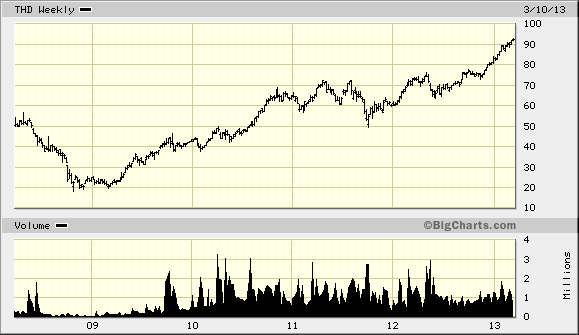
The Thai Stock Market (ETF) on fire up 500% in four years (moving to a mania?)

For those who worked on our moral dilemma (See http://wp.me/p2OaYY-1Lr) please claim your prize. https://www.yousendit.com/download/UVJpZEU4R3NCTWtPd3NUQw
I hope the prize encourages you to study other asset classes and markets outside the U.S. even if you never invest outside America. At least you will be aware of global forces and opportunities/threats. If you hear the world economy is becoming stronger, look at the baltic freight index and copper futures instead.
Howard Marks on the Equity Risk Premium
Many of the important things about investing are counterintuitive. Low-quality assets can be safer than high-quality assets. Things get riskier as they become more highly respected (and thus appreciate). There can be more risk in thinking you know something than in accepting that you don‟t. This counter-intuitiveness is a favorite theme of mine.
…To me, the answer is simple: the better returns have been, the less likely they are – all other things being equal – to be good in the future. Generally speaking, I view an asset as having a certain quantum of return potential over its lifetime. The foundation for its return comes from its ability to produce cash flow. To that base number we should add further return potential if the asset is undervalued and thus can be expected to appreciate to fair value, and we should reduce our view of its return potential if it is overvalued and thus can be expected to decline to fair value.
So – again all other things being equal – when the yearly return on an asset exceeds the rate at which it produces cash flow (or at which the cash flow grows), the excess of the appreciation over that associated with its cash flow should be viewed as either reducing the amount of its undervaluation (and thus reducing the expectable appreciation) or increasing its overvaluation (and thus increasing the price decline which is likely). The simplest example is a 5% bond. Let‟s say a 5% bond at a given price below par has a 7% expected return (or yield to maturity) over its remaining life. If the bond returns 15% in the next twelve months, the expected return over its then-remaining life will be less than 7%. An above-trend year has borrowed from the remaining potential. The math is simplest with bonds (as always), but the principle is the same if you own stocks, companies or income-producing real estate.
…But the study of market history only makes us better investors if it teaches us how to assess conditions as they are, rather than in retrospect.
Marks on Equity Risk Premium March 2013
Doug Casey on Not Hiring MBAs
http://www.kitco.com/news/video/show/on-the-spot/55/2012-10-25/There-Will-Be-Panic-Into-Gold-Casey-Research (see 4 minute 30 second mark)
Interviewer: Do they need a good degree to work at your shop? (www.caseyresearch.com)?
Doug Casey, “We don’t care if someone has an MBA or college. We don’t care whether they went to college. We ask, “Do they have good character, intelligence, diligence, are they hard working and do they want to improve themselves. I don’t see how a college degree has anything to do with that, especially what they are teaching today—gender studies, etc. If someone comes to work for us today with an MBA, we look at them and say, What’s going on in your head that you allocated $100,000 and two years of your life to get more theory instead of doing in the real world.





